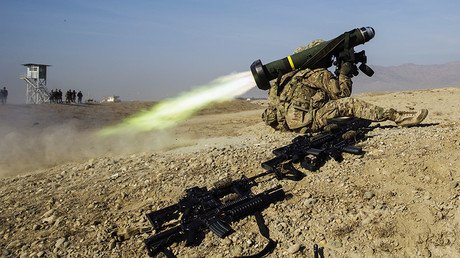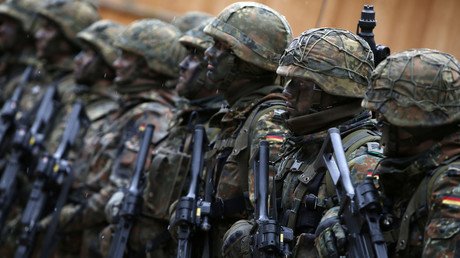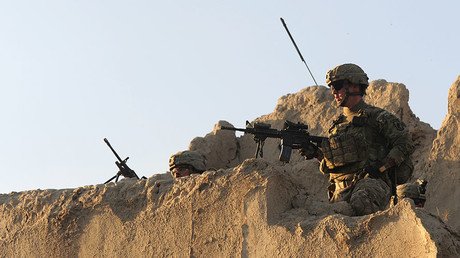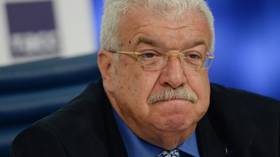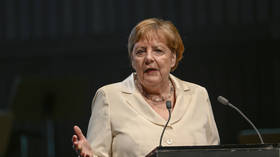Trump’s Afghanistan plan should be judged on whether Germany plays critical role
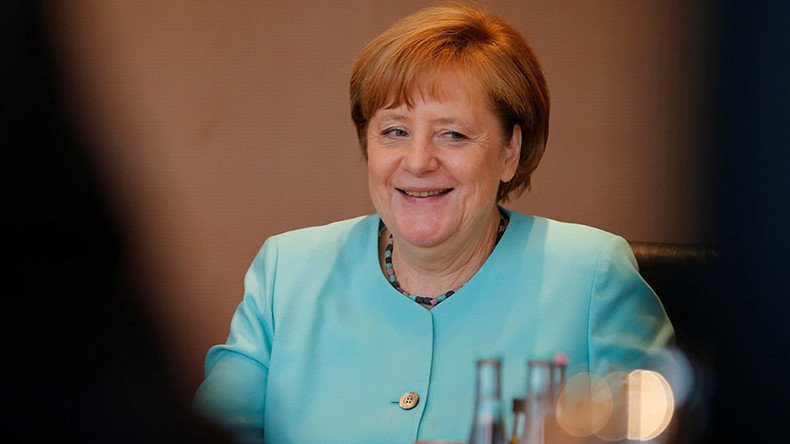
Trump’s Afghanistan strategy may depend on Germany playing a key role as the EU army plan gains momentum. But what are Trump’s chances in Afghanistan if NATO allies simply don’t send troops?
Leader writers in the West will have to face the question of what chance Trump has in Afghanistan if the big guns in NATO don’t support him. While the EU’s dream of working alongside NATO there remains a wet one, Germany is good to go with its own EU army.
While some following Donald Trump’s rumbustious period in office might view his latest gambit in Afghanistan as one of a US president running on empty (he has yet to nail one foreign policy victory), others might see it as a sage move which he allowed his generals to formulate over many months. But aside from the baptism of baloney from Western editors who like to point out the obvious in this wretched country - often called the ‘graveyard of empires’ – there is one over-riding factor which they have all missed in their scramble to demean his latest move: international support.
JUST IN: New US strategy for Afghanistan is ‘dead-end’ – Lavrovhttps://t.co/ptykq6bhLS
— RT (@RT_com) August 24, 2017
Given that Trump deliberately took his time to let his generals develop the idea he wanted them to so deftly produce after six months, some may wonder whether Trump’s shenanigans in Europe earlier in the year had more meaning to them. Was he buttering up Old Europe to get assurances from them to send more troops to Afghanistan?
If he were, France, Germany, and Britain are sure taking their time with the press releases supporting Donald of Kabul. In fact, Berlin made a contrary statement saying Germany would not support Trump.
Looking at this uneasy relationship between Europe and America when it comes to defending the old continent itself – plus a fortuitous and very real drive from the EU to soldier on with bold, yet unclear plans for a new EU army - and a picture emerges of Trump having problems in Afghanistan.
Critically, if Europe – i.e., the big guns of the old continent – don’t support his new plan, then it might have a decisive, dampening effect on its objectives: to secure Kabul, ramp up cooperation from the Ashraf Ghani government and to halt the Taliban’s expansion, forcing it to come to the negotiating table. The generals behind the plan believe this is feasible if Pakistan can be put in line and the US plan can curtail corruption.
It’s a tall order and will need all the international support it can muster.
Forget Brussels' EU army, think Germany
Given moves both in Germany and within the highest echelons of the EU, it seems that Old Europe is unlikely to play the acquiescent role as it did before when it made up the ‘NATO plus others’ coalition which the US ran from the outset.
The EU, first of all, has been dreaming as far back as 2006 of having its own ‘pillar’ in the US-led coalition – a set up of generals who regularly meet in Kabul and decide on strategy, typically made up of the USA, Afghanistan, and NATO. No one is kidding themselves who is calling the shots though, which is why a French general in 2006 told me it’s “time for us to work alongside the Americans and not under them.”
The EU army idea in 2006 was barely embryonic compared to today, where not only does it have all the political support in Brussels (with no UK veto to hinder it), but it also has more of a role to play now. Many EU leaders believe an EU army will galvanize Europe and make the EU a true super power, opening up a sluice of foreign policy initiatives which don’t currently have the support of EU member states. They also believe an EU army would save the EU from any possible further political shakes like Brexit and improve its image around the world as a ‘foreign policy’ player.
So what’s the problem? And why is Afghanistan important?
Essentially, the EU can’t agree on the makeup of the EU army. Several models are being bandied about. Should it be run by one member state (Germany) or like other EU institutions have a revolving leadership? Who should ultimately hold it to account? Member states or the European Commission? And lastly, how does Brussels fund it?
There is one other question which muddies the water: Germany. The most powerful EU country has ambitions of creating its own pan-European army, which by default, will be an EU one if there isn’t one already set up by Brussels complicating matters. Now Brussels finds itself competing with Berlin for much the same idea, which perhaps explains why just days before Trump arrived in Brussels in May plans for a new office were drafted in the Belgian capital dubbed the Military Planning and Conduct Capability (MPCC) facility.
German leaders are adamant a new EU army is about to be formed but prefer to attribute the slow pace to the bureaucracy of Brussels rather than bigger political issues. The EU’s leading proponent of the plan, Jean-Claude Juncker – not exactly a fan of Trump’s – continually stresses the need for EU armies to break free of NATO.
“The protection of Europe can no longer be outsourced. Even our biggest military powers – and I could count them on one, maximum two – cannot combat all the challenges and threats alone,” he said at the Prague Defense and Security Conference in June, prompting German military planners to support the EU army blueprint.
“In the end, there will be a European army,” said Hans-Peter Bartels, the German parliament’s Commissioner for the Armed Forces.
The German official said, eventually the EU will be organized and eliminate “disorganized, technically fragmented, and duplicate structures,” calling on EU states to organize their military forces sooner and create a single military force.
German tanks on the move
While the EU untangles itself in a bid to create a monolithic military organization, Germany jumps the gun. Berlin is already moving.
Both Romania and the Czech Republic have already integrated their regiments into Germany’s, and Berlin is good to go now for any peace keeping hotspot it might chose. The wrangle for the EU is whether to give Berlin the blue armband anyway to extrapolate some political capital, in the event of the German idea actually taking flight.
Going Dutch, but no choppers
Afghanistan would be absolutely perfect for Berlin to test its project, which can hardly be called a secret plan anymore when US main stream media outlets are writing about it in quite some detail. The cat’s out of the bag, and we can only assume German generals are now looking at Afghanistan as a viable opportunity to roll out their plan.
If back channel talks are under way between Trump and Merkel’s people, several scenarios are feasible. One could be Germany as a new pillar in power sharing and strategy; another might be the EU with the German operation adopting the colors that Brussels would dearly like, or a third one would be to allow Germany to go rogue and let Berlin do its own thing.
Notably, Germany has not had a gruesome fighting experience in Kandahar (unlike the UK, US, and Canada) in the south of Afghanistan and it is unlikely to choose this role anyway. But if Trump can put aside his gargantuan ego and longing for everything to be about him, he could score hugely by supporting Germany but refusing the EU its blue armband and seat at the power table – which would be a divisive ruse that Russia would also back. It’s unlikely he would support any notion of a real EU army created by Brussels – as he was warned NATO countries against an EU army - but with his own chaotic and personality-driven style of office, it’s anyone’s guess which way he might go.
Things are moving fast for Germany. Its critics who claim it doesn’t have any helicopters to be a serious army or enough tanks, let alone the money, fail to note that the Netherlands is now also merging its tank divisions with those of Germany. And, according to recent reports, more countries want to join what Germany is calling euphemistically a “network of mini European armies."
Some countries want to cooperate with the ‘Bundeswehr.'
In turn, Germany’s army has a list of junior partners in mind, said Robin Allers, a German associate professor at the Norwegian Institute for Defence Studies who claims he has seen the list.
The Scandinavian countries — which already use a significant amount of German-made military hardware — would be the best candidates for the Bundeswehr’s next round of integration, argues Foreign Policy magazine.
Germany may well not need the cash to be a military power around the world when it has this sort of support. Perhaps now it’s time for Trump to shake Angela Merkel’s hand after all, as she might be a valuable partner in the country which defeated both Obama and Bush before him.
Martin Jay is based in Beirut and can be followed at @MartinRJay
The statements, views and opinions expressed in this column are solely those of the author and do not necessarily represent those of RT.

